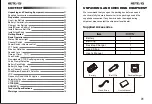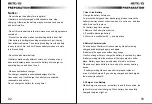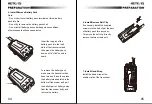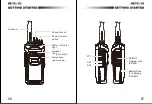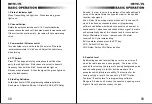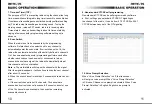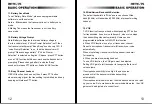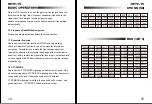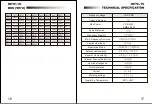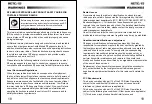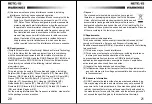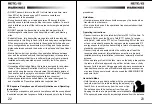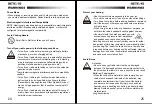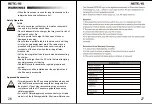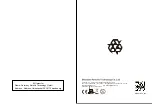
18
19
RF ENERGY EXPOSURE AND PRODUCT SAFETY GUIDE FOR
PORTABLE TWO-WAY RADIOS
This two-way radio uses electromagnetic energy in the radio frequency
(RF) spectrum to provide communications between two or more users
over a distance. RF energy, which when used improperly, can cause
biological damage.
All Retevis two-way radios are designed, manufactured, and tested to
ensure they meet government-established RF exposure levels. In
addition, manufacturers also recommend specific operating instructions
to users of two-way radios. These instructions are important because
they inform users about RF energy exposure and provide simple
procedures on how to control it.
Please refer to the following websites for more information on what
RF energy exposure is and how to control your exposure to assure
compliance with established RF exposure limits:http://www.who.int/en/
Local Government Regulations
When two-way radios are used as a consequence of employment,
the Local Government Regulations requires users to be fully aware of
and able to control their exposure to meet occupational requirements.
Exposure awareness can be facilitated by the use of a product label
directing users to specific user awareness information. Your Retevis
two-way radio has a RF Exposure Product Label. Also, your Retevis
user manual, or separate safety booklet includes information and
operating instructions required to control your RF exposure and to
satisfy compliance requirements.
Radio License
Governments keep the radios in classification, business two-way
radios operate on radio frequencies that are regulated by the local
radio management departments (FCC, ISED, OFCOM, ANFR, BFTK,
Bundesnetzagentur...).To transmit on these frequencies, you are
required to have a license issued by them. The detailed classification
and the use of your two radios, please contact the local government
radio management departments.
Use of this radio outside the country where it was intended to be
distributed is subject to government regulations and may be prohibited.
Unauthorized modification and adjustment
Changes or modifications not expressly approved by the party
responsible for compliance may void the user’s authority granted by
the local government radio management departments to operate this
radio and should not be made. To comply with the corresponding
requirements, transmitter adjustments should be made only by or
under the supervision of a person certified as technically qualified to
perform transmitter maintenance and repairs in the private land
mobile and fixed services as certified by an organization representative
of the user of those services.
Replacement of any transmitter component (crystal, semiconductor,
etc.) not authorized by the local government radio management
departments equipment authorization for this radio could violate the
rules.
FCC Requirements
This device complies with part 15 of the FCC Rules. Operation is
subject to the condition that this device does not cause harmful
interference. (Licensed radios are applicable);
This device complies with part 15 of the FCC Rules. Operation is
subject to the following two conditions: (Other devices are applicable)
(1) This device may not cause harmful interference, and
Before using this radio, read this guide which contains
important operating instructions for safe usage and RF
energy awareness and control for compliance with
applicable standards and regulations.


